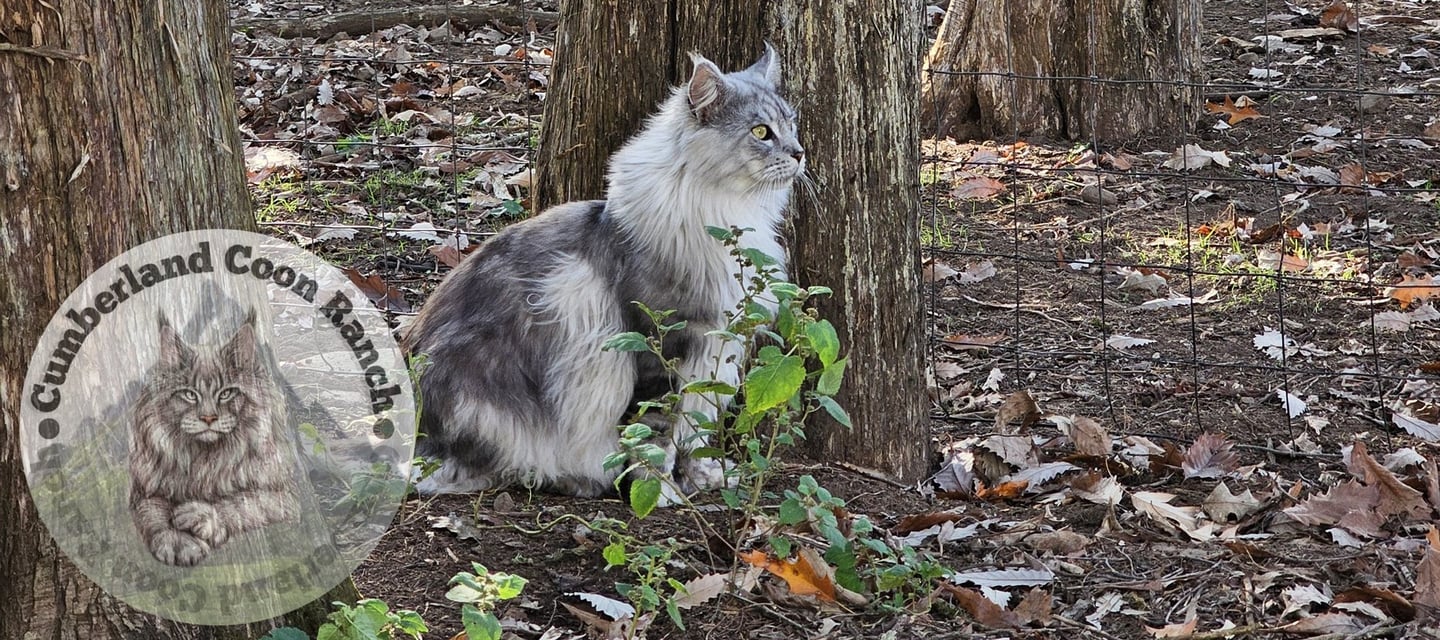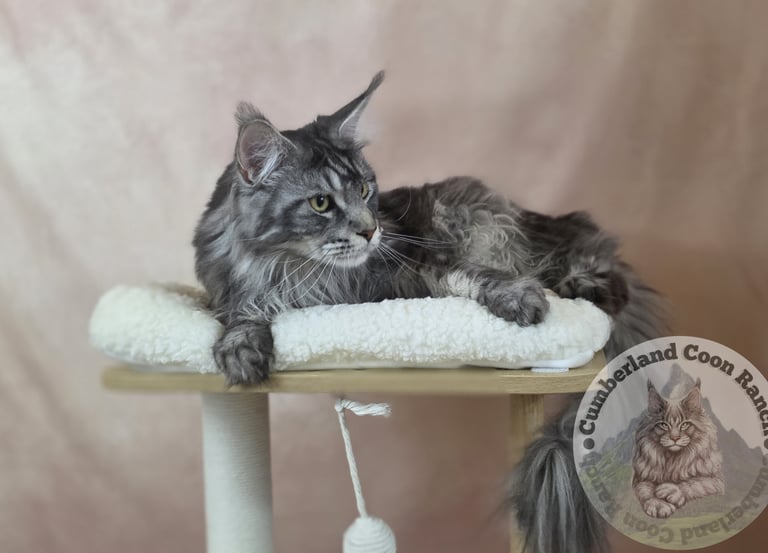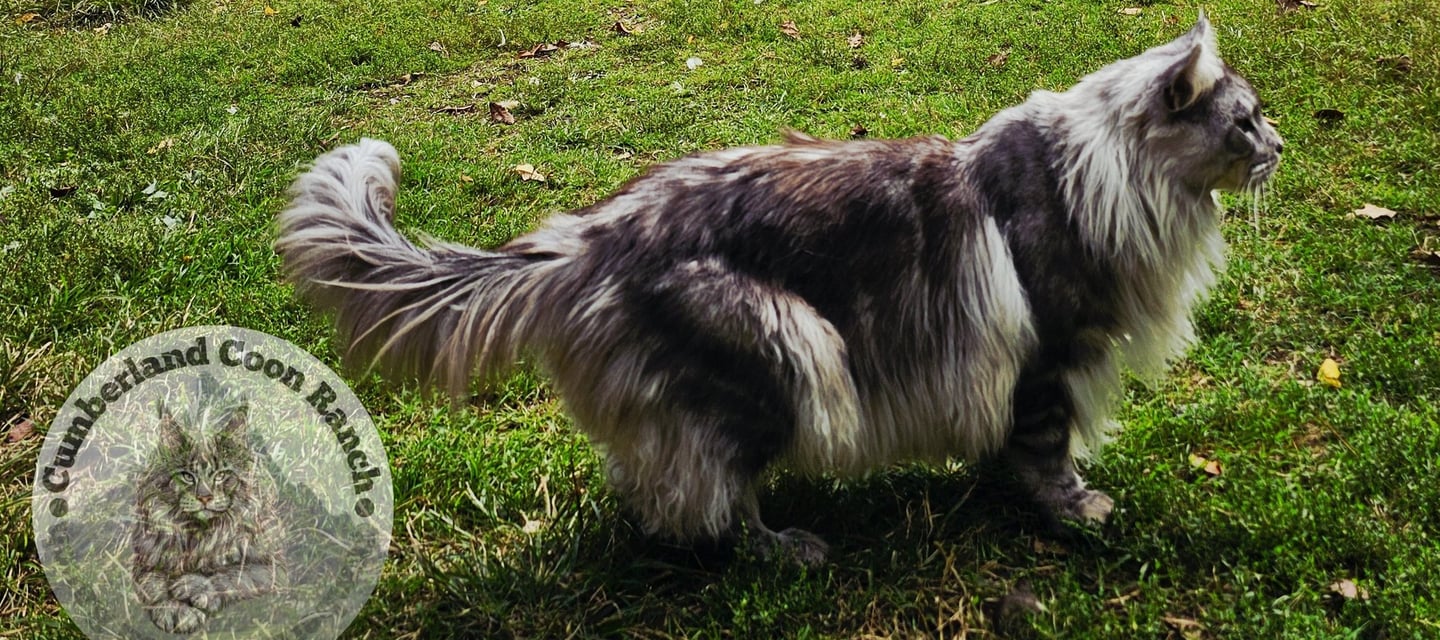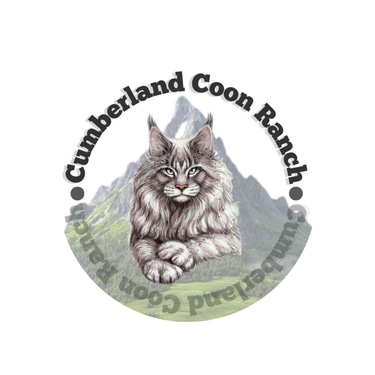About the Breed and Proper care
Maine Coons are large and sturdy cats with very fluffy coats suited to the harsh winters of the Northeast region. They love to hunt and spend time being enticed to chase, so it is very important that they have toys available and do not become restless. They are not aggressive with children or other animals, but can be territorial.
Even more than for their beauty, Maine Coon Cats are noted for their intelligence and kindly disposition. For these reasons they are called the “Gentle Giant” of the cat world and are commonly sought after as family pets, companions and therapy cats.
Maine Coons are generally considered the largest domestic cat breed. They’re big boned and muscular, with males weighing up to 20 – 25 pounds. They can measure up to 40 inches in length and come in 75 different color combinations.
Another very interesting trait about Maine Coons, is that while they are very talkative, they don’t typically “meow”. They chirp and trill (a mixture of a meow and a purr). Cats may chirp when they spot prey and a trill is often an expression of happiness.
They are often referred to as the “dogs of the cat world” because their size is that of a dog and because they display dog-like traits when it comes to loyalty to their family. They will accept the whole family as their own, but will be especially loyal and bonded to the person that cares for them. Maine Coons tend to be highly social and like human interaction. They get sad and unhappy when left alone for too long! They’re known for being friendly, loyal, playful, and they typically get along well with children and other pets. It's common for them to play fetch or walk on a leash!
Just like dogs, they also love water and playing with it. Some even enjoy swimming. A few of our polydactyl cats learned how to open the faucet in the bathroom to play with dripping water!


Proper care of Main Coons
You can help your Maine Coon lead a long, healthy life with lots of love and proper care.


Exercise
Keeping your Maine Coon entertained and active is essential for their health. Regular playtime improves their health, helps regulate weight, and makes them happier. Introduce the following to keep them agile and mentally active: cat climbers and trees, laser and interactive toys. Ideally dedicate at least 30 minutes of your day to your cat play time as they’re very social creatures and require your attention.
Nutrition
A proper diet is crucial for preventing and treating your Maine Coon’s health niggles. Although you cannot fully control hereditary conditions, you can delay their onset and alleviate most symptoms. Knowing what your feline can and cannot eat and how much food they should consume can keep them happy and healthy for a long time.
Grooming
Regular grooming is essential when caring for a feline, even the short-haired Maine Coon. It’s recommended to brush them few times a week, using a soft-bristled brush to avoid tangles. Unless they get extremely dirty, there’s no need to bathe cats. Wipe them with a damp cloth or cat wipes after brushing. It’s also recommended to clip the nails regularly (helps to keep furniture without scratches!). In later age include teeth brushing.


Animal protein: Protein consists of chains of amino acids vital for strong muscles, healthy organs, and normal reproduction. Cats efficiently metabolize protein derived from meat and fish, while they cannot break down plant-based protein properly or absorb essential micronutrients from it.
Animal fat: Fatty acids promote healthy growth, ease inflammation, and keep your Maine Coon’s skin and coat shiny. Make sure to stay within the recommended amount (under 20%) because overconsumption can cause weight gain and related problems.
Vitamins and minerals: These micronutrients are essential for normal development as they support enzyme formation, nutrient utilization, and pH balance. There’s no need for supplements since felines get all necessary vitamins and minerals from meat.
Water: Felines are designed to hunt to survive, and fresh prey, such as birds, frogs, mice, and other small animals, are a sufficient source of moisture to cats in the wild. Domestic cats, however, require fresh water available in several spots of the house. Cats’ thirst drive is low; ideally you should find a way to keep them hydrated through their diet. Dehydration can cause many health issues, such as FLUTDs (feline lower urinary tract diseases).
Dry or wet food? What’s the healthiest choice for your Maine Coon?
Dry food might be cheaper and more convenient to store and serve, but it usually contains sugar and grains, from which felines cannot benefit. Kibble is high in calories and low in moisture (has less than 10%), and a dry-food diet can lead to obesity, allergies, UTIs, and kidney diseases in Maine Coons. It is best to at least provide both kibble and wet food on daily basis.
The pillars of a healthy diet for your Maine Coon are
Cumberland Coon Ranch
Healthy Maine Coons bred with love and care.
Reach us
Contact
(931) 389-4720
© 2025. All rights reserved.
